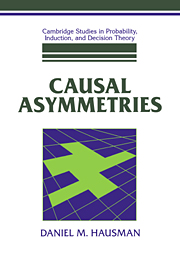Book contents
- Frontmatter
- Contents
- List of Figures
- Acknowledgments
- Introduction: Causation and its Asymmetries
- 1 Metaphysical Pictures and Wishes
- 1* Transfer Theories
- 2 Is Causation a Relation Among Events?
- 3 Causation, Regularities, and Time: Hume's Theory
- 4 Causation and Independence
- 4* Causation, Independence, and Causal Connection
- 5 Agency Theory
- 5* Causal Generalizations and Agency
- 6 The Counterfactual Theory
- 6* Independence and Counterfactual Dependence
- 7 Counterfactuals, Agency, and Independence
- 7* Agency, Counterfactuals, and Independence
- 8 Causation, Explanation, and Laws
- 8* Causation, Explanation, and Independent Alterability
- 9 Probabilistic Causation
- 10 Causation and Conditional Probabilities
- 10* Causal Graphs and Conditional Probabilistic Dependencies
- 11 Intervention, Robustness, and Probabilistic Dependence
- 11* Interventions and Conditional Probabilities
- 12 Operationalizing and Revising the Independence Theory
- 12* Probability Distributions and Causation
- 13 Complications and Conclusions
- Appendix A Alphabetical List of Propositions
- Appendix B List of Theorems
- References
- Index
13 - Complications and Conclusions
Published online by Cambridge University Press: 20 April 2010
- Frontmatter
- Contents
- List of Figures
- Acknowledgments
- Introduction: Causation and its Asymmetries
- 1 Metaphysical Pictures and Wishes
- 1* Transfer Theories
- 2 Is Causation a Relation Among Events?
- 3 Causation, Regularities, and Time: Hume's Theory
- 4 Causation and Independence
- 4* Causation, Independence, and Causal Connection
- 5 Agency Theory
- 5* Causal Generalizations and Agency
- 6 The Counterfactual Theory
- 6* Independence and Counterfactual Dependence
- 7 Counterfactuals, Agency, and Independence
- 7* Agency, Counterfactuals, and Independence
- 8 Causation, Explanation, and Laws
- 8* Causation, Explanation, and Independent Alterability
- 9 Probabilistic Causation
- 10 Causation and Conditional Probabilities
- 10* Causal Graphs and Conditional Probabilistic Dependencies
- 11 Intervention, Robustness, and Probabilistic Dependence
- 11* Interventions and Conditional Probabilities
- 12 Operationalizing and Revising the Independence Theory
- 12* Probability Distributions and Causation
- 13 Complications and Conclusions
- Appendix A Alphabetical List of Propositions
- Appendix B List of Theorems
- References
- Index
Summary
In the discussion above I postponed addressing the problems of preemption and overdetermination as well as the difficulties raised by arbitrary event fusions and complex facts. In this chapter, I confront these problems and then end by drawing overall conclusions in which the pieces examined in the previous chapters will, I hope, find their places.
Overdetermination
Suppose an event e is causally overdetermined by two events, a and c. For example, suppose a and c are simultaneous, a involves pushing button one, which closes a circuit and causes a light to go on. c involves pushing button two, which closes the same circuit at exactly the same time and causes the same light to go on. e is the light going on. If a had not occurred, c alone would have caused e. If c had not occurred, a would have caused e. As things are, however, it is not the case that only one of a or c caused e. Either they both caused e or neither caused e. Each of them is a “causal overdeterminer” of e.
What is this relation of causal overdetermination? The most common approach in the literature, which I will endorse, denies that causal overdeterminers are causes. If a and c are causal overdeterminers of e, then neither a nor c is a cause of e. Instead one takes the instantiation of the disjunctive property, A or C at the relevant place and time as a cause of e.
- Type
- Chapter
- Information
- Causal Asymmetries , pp. 263 - 276Publisher: Cambridge University PressPrint publication year: 1998



